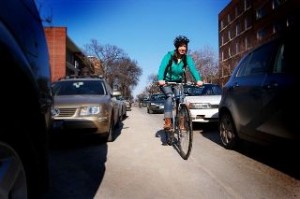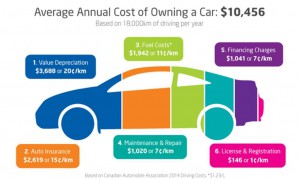
Navigating traffic (Photo: Green Action Centre by permission)
The average Manitoba household spent more than $11,000 on transportation last year, according to a new release from Statistics Canada. Across Canada, more than 1 in 5 dollars of household consumption was spent on transportation.
Over the past 10 years, the amount Canadians have spent on transportation has increased at a rate faster than the rate of inflation. Today, we spend 50 per cent more on transportation than we did a decade ago. A further discouraging trend highlighted in these statistics is the increased ownership of multiple vehicles: 38.8 per cent of households owned two or more vehicles in 2011, up from 37.5 per cent the previous year. Households with two or more cars are less likely to walk their kids to school or to bike, bus or walk to work.
Compared to other countries, Canadians have a very expensive transportation system. In the UK, the average household spent only $5,500 on transportation in 2011, about 13 per cent of their household budgets. Swedes devote 15 per cent of their spending to transportation, despite much higher gas prices in both countries.
 The vast majority of transportation spending is for private automobiles. It cost a typical household $10,456 to own and operate private automobiles in 2014 (based on CAA data), compared to $1,077 spent on public transportation. These figures relate to consumer spending only and do not account for the billions of dollars spent by governments on roads and infrastructure needed to operate private vehicles. Here is how the cost of driving breaks down.
The vast majority of transportation spending is for private automobiles. It cost a typical household $10,456 to own and operate private automobiles in 2014 (based on CAA data), compared to $1,077 spent on public transportation. These figures relate to consumer spending only and do not account for the billions of dollars spent by governments on roads and infrastructure needed to operate private vehicles. Here is how the cost of driving breaks down.
All of this reliance on private vehicles not only eats up our personal budgets, it whittles away at our economic competitiveness. One survey found that traffic congestion costs over $3 billion in annual GDP across Canada, including $100 million in Winnipeg alone.
Spending more than 20 per cent of our annual household budget on transportation is not good for our financial welfare. But we have options to reduce how much we spend each year on transportation. Try taking the bus, biking or walking to work. Get rid of your second vehicle. Consider joining a co-operative carshare. If we brought down our spending on transportation to the levels of the Swedes and Britons, we would free up billions of dollars for other things in life that are much more important to us than being stuck in traffic.



Here’s a campaign idea: “Fund your retirement with alternative transportation”. If people could see how that $11 000 per year adds up $440 000 over 40 years. Unfortunately, the work opportunities for those who don’t drive are severely limited, and not everyone is physically able to cycle. I have made the switch to transit, but there are certain people and places I am no longer able to visit, so it has been a social disadvantage that I have had to accept.
There is another dynamic for more cars on the road, most have to leave their community to find work. Or have a second or third job. Riding a bike to work or between jobs sometimes isn’t a viable option.
Or car pooling if you live outside of the area you work in.
I found myself in such a situation for the past 2 years, and it drove me crazy. I hated the lifestyle of the “car” nor did I enjoy the effects it had on my body or bank account. Spending an hour in traffic and being irritated by it, left me stress out and grumpy.
I am fortunate I have found work a bit closer to my community, in the summer it will be a 45 minute bike ride both ways.
very interesting numbers indeed — I take transit so even with the ‘odd’ taxi situation I do believe I spend less on transportation situation
Very interesting numbers! We got rid of our second vehicle about 15 years ago because it was always just too easy to jump in the car rather than bike or bus. Eventually that led to sharing one vehicle with another family and now we’re members of Peg City Car Co-op. I don’t have the precise number but I know we spend WAY less on transportation than $11,000 per year.